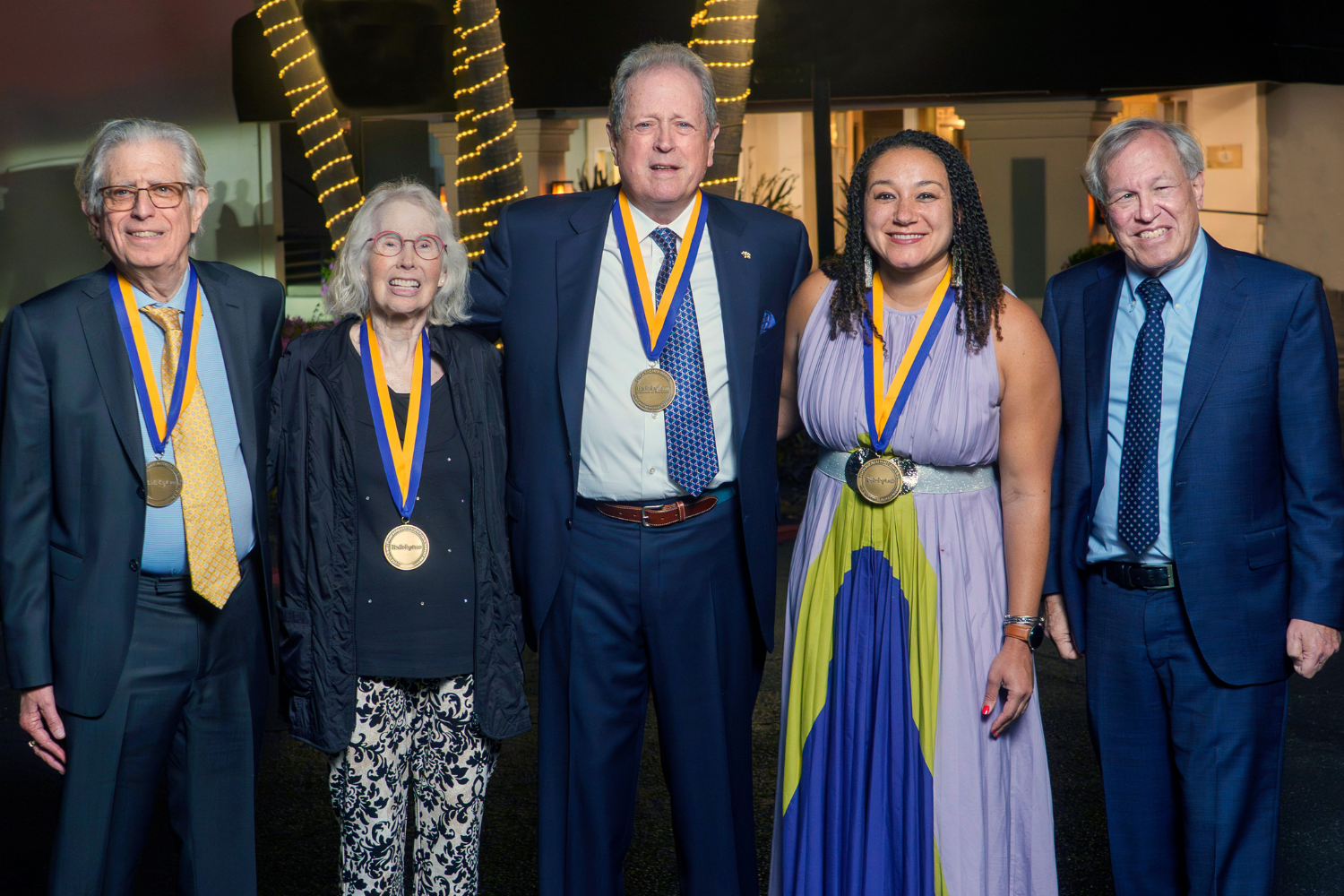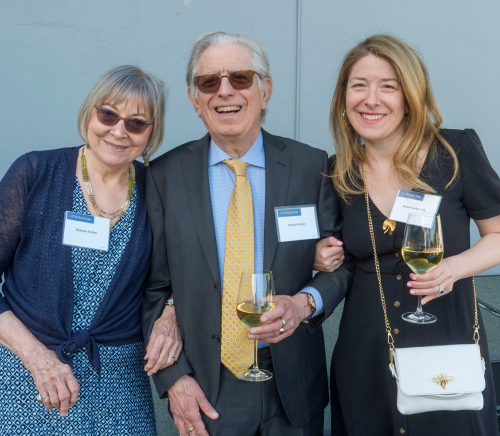
By Gwyneth K. Shaw
To explain what makes UC Berkeley Law so special, Mark A. Bertelsen ’69 reached all the way back to a Latin phrase: genius loci, or “the spirit of the place.”
Speaking at the school’s recent annual Alumni Awards & Donor Celebration, Bertelsen said he was struck by UC Berkeley Chancellor Rich Lyons’ recent emphasis on access and excellence as the university’s main pillars.
Born in Los Angeles in 1944, rising from the grandson of immigrants who arrived from Norway and Germany to a storied career at the Silicon Valley powerhouse Wilson Sonsini Goodrich & Rosati — where he’s now partner emeritus — Bertelsen said that resonated with him and his experience in law school.

“The thing about Berkeley, for me, was access. To my generation, having access to a place like Berkeley and the University of California was a huge thing,” he said. “I’ve always appreciated that, and I think both are key. If you devalue one you devalue the other.
“Berkeley is this powerful engine — an engine of social mobility, an engine of the future, an engine of competitiveness, and it’s all done within the context of its public service mission.”
Bertelsen received this year’s Citation Award, UC Berkeley Law’s highest honor recognizing exceptional contributions to the school, the bar, the bench, legal scholarship, the state, the nation, and the world.
Professor Daniel A. Farber received the Faculty Lifetime Achievement Award, Monique E. Liburd ’08 was honored with the Young Alumni Award, and Senior District Judge Maxine M. Chesney ’67 was presented with the Judge D. Lowell and Barbara Jensen Public Service Award.
Gratitude and reflection
Farber, who joined the faculty in 2002, talked about the upward trajectory of UC Berkeley Law under two transformative deans: the late Christopher Edley Jr. and current Dean Erwin Chemerinsky, who’s led the school since 2017.
“It’s really a different school than it was 20-some years ago when I arrived,” he said.
While considering whether to come to UC Berkeley Law, he added, other schools “felt kind of stuffy and set in their ways. Berkeley felt like a place where people were having interesting ideas.”
Farber has shepherded two of those new concepts to fruition: The Center for Law, Energy & the Environment — founded in 2005 and now a leader across multiple fields — and the Edley Center on Law & Democracy, created last year to honor the former dean’s incredible legacy. Farber is faculty director of both centers.

“I found working with these various centers to be very rewarding,” he said. “I’m going to tell you my management secret: It’s based entirely on luck. The first step is to get lucky by hiring unbelievably good people, and then after that, all you need to do is help them succeed, right?”
Farber also credited his daughter, Sonia Farber ’10, with helping him become a better teacher after seeing her own experience in law school, and his wife, Dianne.
“All of this has been made possible by a lot of support from others,” he said. “That’s the other part of the luck that’s important for success.”
A commitment to service
Liburd, now senior trademark counsel at Google, serves on the UC Berkeley Law Alumni Association Board and outlined how rewarding it’s been to mentor prospective, current, and recently graduated students as she’s stayed involved with the school.
“Their fresh perspective, impressive talent, and deep commitment to making a difference in the world fuel my own dedication to our profession and this community,” she said. “I love watching their growth, and I’m so fortunate to play even just a small part in their journey.”
As a student, she was involved with Law Students of African Descent, the California Law Review, the Berkeley Journal of Black Law & Policy, and the East Bay Community Law Center, and has served on the center’s board since 2017. The Young Alumni Award, Liburd said, is a recognition of her journey but also a powerful reminder of the values instilled in her at UC Berkeley Law: intellectual rigor, social justice, and critical engagement.
“While there will be others who accept this award in the future, I can say with certainty there won’t be any who are more appreciative,” she said.
Liburd said institutions like UC Berkeley Law — and the involvement of its alumni — are more crucial than ever at a time when the rule of law and access to legal services for everyone is under threat. Whether it’s challenges to fundamental rights, the complexities of an increasingly digital world, or the basic need for legal aid in our neighborhoods, the demand for dedicated, ethical, and compassionate legal professionals is significant, she added.

“Supporting our law school means fighting for our ideals and investing in the next generation of leaders who will uphold justice, champion fairness, and protect the vulnerable,” Liburd said. “That’s why I’m so committed to my service with the Berkeley Law Alumni Association: It’s a direct way to ensure that this institution continues to thrive and produce graduates who will make a difference.”
‘You can do this’
Chesney recalled how she was one of 15 women in her 1L class — an “odd mix,” she said, but many of them remain friends today.
Her time at UC Berkeley Law “did give me the confidence to strive for a career that might have been something outside of what would have been the accepted norm at the time,” she said. “And it did instill in me a desire to do something of value beyond simply personal benefit.”
Chesney worked in the San Francisco District Attorney’s Office after law school, then became a San Francisco Municipal Court judge and later a judge on the Superior Court of California for the City and County of San Francisco. In 1995, then-President Bill Clinton appointed her to the U. S. District Court for the Northern District of California; she took senior status in 2009.
She said she was floored, and profoundly grateful, when Chemerinsky told her she’d won the Public Service Award. Chesney said she’d admired Lowell Jensen for years and was particularly honored to receive an honor in his name.
Chesney detailed her love of being a judge and thanked some of her colleagues, who attended the event. Over the years, she added, when things got tough, she would always repeat a mantra about UC Berkeley Law, “to which I owe an immeasurable debt of gratitude.”

“It set me on the path that has led me to where I am today,” she said. “And when obstacles arise, as they will in anything worth doing, I just stop and I say to myself, ‘You went to an outstanding law school. You can do this.’”
Watching history
During his remarks, Bertelsen noted the “huge impact” the law school had on his firm, from Larry Sonsini ’66 deciding to head for Palo Alto instead of Wall Street — at least partially at the suggestion of then-Professor Richard Jennings ’39 — to Bertelsen’s own experience as a first-year associate, when he and Mario Rosati ’71 drew on a California Law Review article by Professor Richard Buxbaum LL.M. ’53 to create an early venture capital financing plan.
As the tech titans of Silicon Valley got off the ground, Bertelsen said, Wilson Sonsini’s offices were front and center for the boom.
“We were the equivalent of the mining company located next to Sutter’s Mill, instead of being located in San Francisco or Sacramento providing tools to the gold miners — except in this case, they were engineers and scientists,” he said. “Nobody, not the most optimistic VC or entrepreneur, ever thought that technology would become as ubiquitous or overwhelming as it has become.”